


The National Insurance Company had signed a Memorandum of Understanding (MoU) with the Chief Electoral Officer of Bihar in 2000 to provide insurance coverage to individuals working during the assembly elections. However, the Supreme Court has recently ruled that the clause "death only resulting solely and directly from accident caused by external violent and any other visible means" in the insurance policy will not apply to a death caused by sun-stroke during election duty.
The case in question pertained to the death of an officer who had been deployed for election duty during the 2000 assembly elections. The officer had died due to sun-stroke while carrying out his election duties. Despite this, the Supreme Court has held that the insurance policy clause regarding accidental death does not apply in this case.
A bench of Justices SK Kaul and AS Oka of the Supreme Court recently dealt with the issue of whether insurance coverage could be claimed under a Memorandum of Understanding (MoU) entered into by the National Insurance Company and the Chief Electoral Officer of Bihar in 2000. The question arose in the context of the death of an officer who died due to sun-stroke while on election duty. The widow of the deceased claimed coverage under the insurance policy, but the insurer contested the claim. The Patna High Court had earlier granted relief to the widow, which was challenged in the Supreme Court by the insurance company. Ultimately, the Supreme Court allowed the insurer's appeal and held that the death due to sun-stroke did not fall within the scope of the policy agreement.
The guiding principle for interpreting an insurance policy is to read it plainly and strictly,
The Supreme Court relied on the precedent of Alka Shukla vs Life Insurance Corporation Ltd in holding that a plain and strict reading of an insurance policy is essential to interpret it. The Court emphasized that a "proximate causal relationship between the accident and the body injury is a necessity" in determining what constitutes an "accidental death" under an insurance policy. The importance of interpreting an insurance policy by a plain reading was also underscored as a guiding principle.
The Supreme Court emphasized the importance of a plain and simple reading of an insurance policy to determine its applicability. The Court stated that the admissibility of a claim in the policy was only in the event of death resulting solely and directly from an accident caused by external violence or any other visible means. The clause "any other visible means" should be read in the context of ejusdem generis with the external violent death and cannot be interpreted in isolation. The Court held that death due to sun-stroke did not come under the purview of the policy agreement as it did not result from external violence or any other visible means. Therefore, the insurer's appeal was allowed, and the widow was not entitled to claim insurance coverage.
Click Here to: Download/View Related File
TAGS: sunstroke election death by sunstroke judgements supreme court